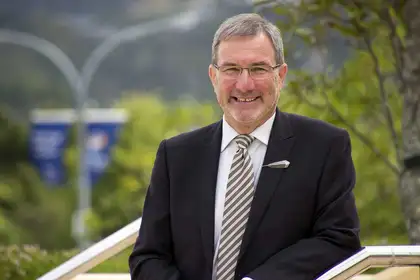
Pathways will bring together diverse experts on New Zealand's population trends, says spokesperson Distinguished Professor Paul Spoonley.
The hottest issues and latest trends on immigration and diversity will be under scrutiny at the annual Pathways conference hosted by Massey University this week.
Co-organiser and spokesperson Distinguished Professor Paul Spoonley, a sociologist at Massey and frequent media commentator on international migration and diversity, says the conference will bring together a range of commentators, researchers and policy analysts from New Zealand and overseas. Top of the conference agenda will be discussions about the role of religious leadership, community relations and welcoming new settlers.
Professor Spoonley says organisers are delighted to have Professor Steve Vertovec, Director of the Max Planck Institute for the Study of Religious and Ethnic Diversity, Germany, to headline the conference. Professor Vertovec, who coined the term ‘super-diversity’, will outline international trends in an age of hyper-mobility and populist nationalism.
Established in the 1990s as an annual opportunity to analyse the findings of publicly-funded research on international migration and demographic change, the Pathways, Circuits and Crossroads conference is hosted this year by the CaDDANZ (Capturing the Diversity Dividend of Aotearoa/New Zealand) research team from Massey University, the University of Waikato, Auckland Council, the Human Rights Commission and Diversity Works NZ. This year’s conference, He Rākau Tau Matua: Diversity and Inclusion, will bring together 200 people from research, government, regional and community organisations. He Rākau Tau Matua translates as “a tree that provides the sustenance and safety to all those who inhabit the forest.”
Conference organisers say the face of New Zealand is changing rapidly as a consequence of the settlement of migrants from all over the world, temporary and circular international migration, growing ethnic diversity, population ageing, changing fertility patterns and urban growth.
Other conference topics include:
- The politics and policy of contemporary immigration
- Policy evaluation
- Religious leadership and diversity
- Local approaches to diversity
- Young people of Aotearoa speak about identities and aspirations
- Migration and settler colonialism
Keynote speaker information
Keynote speaker Professor Steve Vertovec is a world-leading researcher on multiple immigration-related issues, including the rise of super-diverse cities, globalisation and transnational social formations, international migration, ethnic diasporas and urban diversity. He will open a session on Super-diversity and the Social Organisation of Difference.
Associate Professor Amanda Wise, from Macquarie University, Australia, will speak on the issue of everyday multiculturalism and the structures that shape urban conviviality. She is a sociologist with interests in multiculturalism and “lived diversity” (especially everyday multiculturalism) in Australia and Singapore; cultural attachments to and formations of place; and national and cultural identities.
Father Rod Bower, Gosford Anglican Church, Australia, will speak on religious diversity and the mixing of Church and State, while Race Relations Commissioner Dame Susan Devoy gives an opening address on the topic.
Father Bower is an ambassador for the Refugee Council of Australia and Chairman of the Board of Lakes Grammar, an Anglican School. He is a passionate advocate for a number of social justice and human rights issues, including marriage equality. He believes that the treatment of asylum seekers in Australia, the lack of action on climate change and the failure to adequately recognise First Nations people damages Australia’s “corporate soul”.
How welcoming are New Zealand organisations?
Other presenters include Robin Peace, an Associate Professor in Research and Evaluation based in the School of People, Environment and Planning at Massey. She is also the director of eSocSci (engaged Social Science Hui Rangahau Tahi) – a project aiming to connect social scientists across New Zealand research institutions to enhance the accessibility of research for policy purposes.
She will discuss institutional responses to increasing diversity in New Zealand. With independent researcher Geoff Stone, from the newly-formed Ripple Collective, Associate Professor Peace will present findings on how a range of government and non-government agencies play an instrumental role in facilitating newcomer settlement.
Dr Jessica Terruhn, a senior researcher at Massey and CaDDANZ, will discuss ways of thinking about the meaning of difference and diversity in cities such as Auckland.
Pathways runs from February 8-9 at Massey University’s Auckland campus, Albany.
For more information on registration and programme details, go to CaDDANZ.
Follow the conference on Twitter #diversityAotearoa or #caddanz